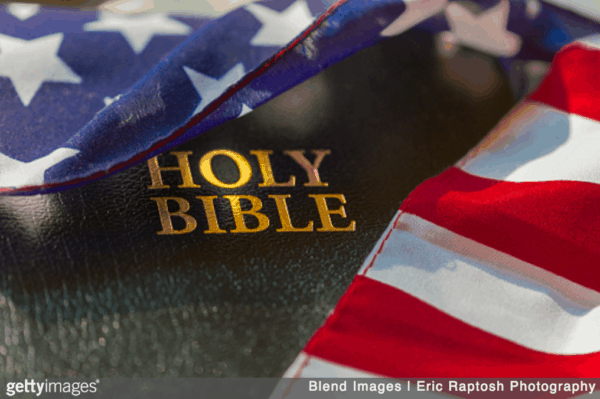This is the first installment of two in which Bill McCormick, our resident political scientists, asks us to consider the delicate dance of faith and politics.
A great deal has been made of a recent Pew survey showing high evangelical support for the newly-crowned Republican candidate for president, Donald Trump. The report is worth reading in full, but what stood out to me is why Trump has been attracting evangelical support. Trump is not — by any stretch of the imagination — the dream candidate of evangelical Christians, but they do perceive him to be the best option they’ve got. “Evangelicals are willing to embrace less-religious candidates in order to maintain political clout,” as one story put it.
Indeed, many evangelicals have supported Trump for some time now (including against other Republican candidates like Ted Cruz, who claimed better evangelical credentials). From the inside, compromising in favor of an electable political candidate is reasonable, to attain the more important policy goals which reflect their religious convictions. Yet to the outsider, it might appear that such evangelical voters are allowing political expediency, rather than religious convictions, to dictate their decisions.
* * *
This touches on a perennial election-cycle question: how do American voters negotiate the relationship between their political and religious beliefs? When push comes to shove, which comes first? For Catholic Christians, this line of questioning fortunately has some answers on offer. The Church has developed an extensive Social Teaching, which provides principles for guiding our thought and action in matters political, social and economic. But how many of us are familiar with that body of work? And how many of us apply it intelligently to the issues that confront us in our political life?
The first step is admitting that there might be some disagreements between any one party platform and the Good News. And so today, in the midst of the GOP Convention in Cleveland, we ask: Can a good Republican be a good Catholic?1
Before you answer with a resounding how dare you? — consider — what does this question even mean? I am going to hazard that most of us assume that our faith and our politics are compatible, that what we believe about politics and what we believe about God are coherent and consistent. After all, I am a reasonable adult and I have life experience to back up my convictions. But what about when our faith and politics are not consistent? How might we know when they are not?
* * *
We know that we’re often not always so Christian in our daily life. Why should politics be any different? Sometimes when I am stuck in bottleneck traffic, I am patient and wait my turn. I see others whiz past and slow the rest of us down, and I cling to the moral high ground of being fair and waiting my turn. Other times, I blow past other people because, hey, I have places to be, and I don’t want others to take advantage of me. Both of these lines of thinking can appeal to us as reasonable responses to life experience. But when writ large — i.e., if we had to enforce traffic policies along these lines — one is forced to ask whether my second response (everyone freely pushing to get ahead of everyone else) makes for good social policy.
In politics, it is easy to say: “These are my political beliefs, and I think they cohere with Catholic teaching.” It is far harder to say: “I have reflected upon Catholic teaching, and I think this is the kind of policies and politics it calls for in this situation. I will now judge my political beliefs and views — tinted as they can be with my own interests — in the light of the ideas presented in Catholic Social Teaching.”
Why? Because it’s easy and comforting to start with the political positions we already hold, and then justify them post hoc with easy-to-reach snippets from Catholic Social Teaching. This goes for Republicans and Democrats alike. It is much harder — and surely much rarer — to attempt to come to grips with what the Church (and Christ!) asks of us in our political life.
In other words, most of us can readily identify when our political positions coincide with Church teaching. And we tend to be equally good at seeing when opposing political positions conflict with Church teachings. But few of us are keen to admit it when our political positions conflict with Church teaching. And, I suspect far fewer are ready to admit when opposing political positions hew closer to Church teaching than we do.
To go back to the bottleneck driving example, it’s the difference between playing the songs “Jesus Take the Wheel,” and “I Did It My Way.” And reflecting on the Church’s Social teachings help us to realize when we have the latter playing in the background, and we don’t even realize it.
* * *
This may still seem rather abstract, so let’s take a concrete example. Immigration has been a difficult subject for both parties, and no less for their Catholic members. But one finds disagreements here, even within the GOP.
Immigration often divides the GOP between pro-immigration business interests and anti-immigration protectionists. The former tout America’s historically welcoming attitude to the world, the need for cheap labor and the desire to remain open to global markets. For the latter, immigration represents (a) a threat to jobs for U.S. natives, (b) the specter of porous borders that cannot be controlled, and (c) broken law and “amnesty” to law-breakers.
And so it’s no surprise that the Catholic entering this dialogue — let’s call him Johnny Catholic — is probably already conflicted between these varying personal, political and economics interests, even before he might consider what the Church teaches. The question is, do we recognize how these interests are at play in the background?
Johnny Catholic can find Catholic teachings to justify positions both for and against immigration. But what if he took a step back from that morass and asked first what Catholic social teaching might ask of him? What if he started by considering the example of Jesus, steeping himself in the social encyclicals, and, most importantly, praying about how God might be calling him to act in the world? This is not mere pious pap. This is a changing the lenses with which Johnny Catholic views the important questions he faces. It is seeking a balanced, apolitical second opinion on the complex issues we face as a nation.
I can hear some eyes rolling right now, so let me entertain one possible objection to what I’m saying: Look, it’s fine to want to follow the Catholic Church’s principles for living as a Catholic in complex societies. But those principles are not recipes or quick-fix political solutions. I admit, it requires a great deal of knowledge of Church teaching and politics to have any sense for how Church teaching applies to a particular political context.
And yes, I agree, it is frustrating to see public commentators breezily claim that a policy is or is not consistent with Catholic teachings. Even if a policy is consistent on paper, it does not mean that it is the best way to achieve the goals of Catholic Social Teaching. The policy might just be a bad policy, whatever its goals. Do we really care that a policy is consistent with Catholic Social Teaching, if it’s not going to have meaningful effects? This is a reasonable question to consider.
And what makes for good policy is at least in part an ideological issue. Many Republicans, for instance, came to Paul Ryan’s defense in the kerfuffle in 2012 about his budget proposal. Maybe Ryan’s proposals really were consistent with Catholic Social Teaching, but that was only half the complaint of his critics. At least as great an issue was the effects of his policies. As one critic put it: “his budget has a devastating impact on programs for the poor.” No one was really arguing about the principles of Catholic Social Teaching. The real argument, which often became ideological, was how to enact them in complex situations.
* * *
So, yes, the work of asking how to put our Catholic faith before our politics is hard. But this kind of work seems hard from the outside, because we are not accustomed to starting with prayerful reflection or moving beyond the realm of my own experience as a reasonable adult. You might feel frustrated here — so what am I to do?
Can I be Catholic and Republican?
The answer is yes; of course. But the challenge is to keep those words in their proper order. This election season, let’s spend less time thinking about short-term political gains, and more time thinking about God. When conversation turns to politics, as it inevitably will, we do well to ask ourselves — and friends — how God might see these debated issues. How, pray tell? We can start by taking a look at some key points of Catholic Social Teaching. We can let them challenge some of our convictions and beliefs about politics, just as they will naturally affirm others. One’s convictions are not likely all wrong, but they might also need a little examination — even among us reasonable adults.
When you’re sitting in the thick of traffic, which song do you hear playing? “Jesus Take the Wheel,” or “I Did It My Way”?
–//–
Title image, by Eric Raptosh, follows fair usage policies of Getty Images.
- For those who might bristle at this question, fear not. The same question will be posed next week to Democrats! ↩


